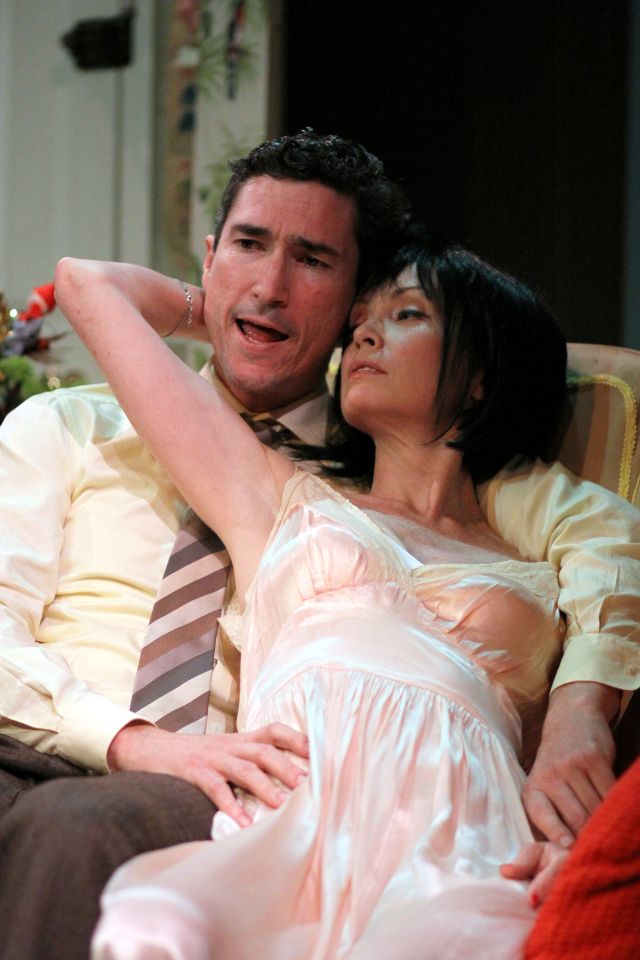The work of William Inge doesn't get much of a look-in on British stages, but the American dramatist's depictions of frustrated aspirations and desires at work in small-town Midwestern lives - most famously realised in the Pulitzer-winning Picnic and Bus Stop - received major Broadway productions in the 1950s. Natural Affection is a later work dating from 1962 which foundered partly due to a New York City newspaper strike, not re-emerging until an Off Broadway run last autumn. But this UK premiere suggests that it was more than a lack of coverage that may have done it for a play that fascinates in parts while ultimately unravelling towards screeching melodrama.
Its story inspired by a newspaper report Inge had come across of an apparently senseless killing, the play tells of department store buyer Sue Barker (Lysette Anthony), who lives in a cramped Chicago apartment with her younger lover, Bernie (Timothy Knightley). Although car salesman Bernie likes to throw his weight around, it is Sue who pays the bills as she clings to the dream that she will be married before she hits 40. At the same time, feckless Bernie - who has been fooling around with the blowsy blonde next door - cites his discomfort at not being the breadwinner as the reason he won't pop the question. But the truly disruptive element arrives in the form of Sue's teenage son Donnie (Louis Cardona), who is on Christmas release from reform school and wants to persuade his mother to let him stay. Their confused, dangerously sexualised relationship kick-starts a spiral towards violence and destruction.
 The tiny Jermyn Street Theatre would, you'd think, provide a perfect setting for such intense domestic drama, but Grace Wessels's rather tepid production never really submerges us in the potent plotlines. Anthony, too, gives a strange reading of Sue: curiously detached with exaggeratedly slow body language that doesn't chime with the heated emotional exchanges and seems to suggest she's in a Mogadon haze. Inge's dialogue needs careful handling so as not to seem flat, whereas here it can teeter into the toneless. Knightley's Bernie is more convincing, flashing the ugly pugnaciousness behind the salesman's slick patter; Cardona's Donnie is surprisingly sweet in his shyness and displays of a fierce - if twisted - desire for maternal love. (Anthony and Knightley are pictured above.)
The tiny Jermyn Street Theatre would, you'd think, provide a perfect setting for such intense domestic drama, but Grace Wessels's rather tepid production never really submerges us in the potent plotlines. Anthony, too, gives a strange reading of Sue: curiously detached with exaggeratedly slow body language that doesn't chime with the heated emotional exchanges and seems to suggest she's in a Mogadon haze. Inge's dialogue needs careful handling so as not to seem flat, whereas here it can teeter into the toneless. Knightley's Bernie is more convincing, flashing the ugly pugnaciousness behind the salesman's slick patter; Cardona's Donnie is surprisingly sweet in his shyness and displays of a fierce - if twisted - desire for maternal love. (Anthony and Knightley are pictured above.)
Wessels never stokes a sufficient sense of smouldering menace and lets things stay too stilted at crucial moments, though she does give due prominence to the best speech as and when it lets rip from Sue and Bernie's cuckolded, acoholic neighbour Vince (Jonathan Wadey). As he tips from grumpy old-man rant ("there haven't been any good movies since .... Norma Shearer") to the anguished confession that he doesn't know "how to live", his fevered despair anchors the play in a wider moment of anxious upheaval and fear for the future. Wadey tussles with the Midwest accent and with playing drunk but the lines still pack a punch, even if you don't know just how alarmingly close to Inge's own story some of Vince's character sails.














Add comment